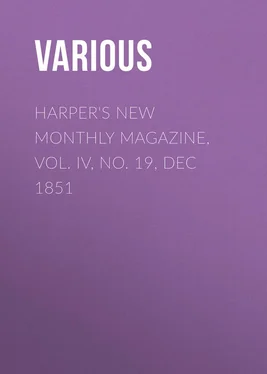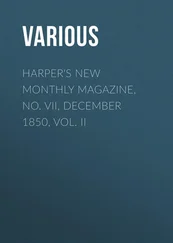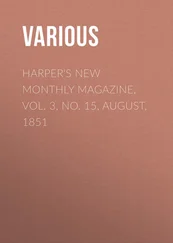Various - Harper's New Monthly Magazine, Vol. IV, No. 19, Dec 1851
Здесь есть возможность читать онлайн «Various - Harper's New Monthly Magazine, Vol. IV, No. 19, Dec 1851» — ознакомительный отрывок электронной книги совершенно бесплатно, а после прочтения отрывка купить полную версию. В некоторых случаях можно слушать аудио, скачать через торрент в формате fb2 и присутствует краткое содержание. Издательство: Иностранный паблик, Жанр: periodic, foreign_edu, на английском языке. Описание произведения, (предисловие) а так же отзывы посетителей доступны на портале библиотеки ЛибКат.
- Название:Harper's New Monthly Magazine, Vol. IV, No. 19, Dec 1851
- Автор:
- Издательство:Иностранный паблик
- Жанр:
- Год:неизвестен
- ISBN:нет данных
- Рейтинг книги:5 / 5. Голосов: 1
-
Избранное:Добавить в избранное
- Отзывы:
-
Ваша оценка:
- 100
- 1
- 2
- 3
- 4
- 5
Harper's New Monthly Magazine, Vol. IV, No. 19, Dec 1851: краткое содержание, описание и аннотация
Предлагаем к чтению аннотацию, описание, краткое содержание или предисловие (зависит от того, что написал сам автор книги «Harper's New Monthly Magazine, Vol. IV, No. 19, Dec 1851»). Если вы не нашли необходимую информацию о книге — напишите в комментариях, мы постараемся отыскать её.
Harper's New Monthly Magazine, Vol. IV, No. 19, Dec 1851 — читать онлайн ознакомительный отрывок
Ниже представлен текст книги, разбитый по страницам. Система сохранения места последней прочитанной страницы, позволяет с удобством читать онлайн бесплатно книгу «Harper's New Monthly Magazine, Vol. IV, No. 19, Dec 1851», без необходимости каждый раз заново искать на чём Вы остановились. Поставьте закладку, и сможете в любой момент перейти на страницу, на которой закончили чтение.
Интервал:
Закладка:
Among the demands made by the Hungarian Diet was that of a separate and responsible Ministry for Hungary. The Palatine, Archduke Stephen, to whom the conduct of affairs in Hungary had been intrusted, persuaded the Emperor to accede to this demand, and on the following day Batthyanyi, who with Kossuth and a deputation of delegates of the Diet was in Vienna, was named President of the Hungarian Ministry. It was, however, understood that Kossuth was the life and soul of the new Ministry.
Kossuth assumed the department of Finance, then, as long before and now, the post of difficulty under Austrian administration. The Diet meanwhile went on to consummate the series of reforms which Kossuth had so long and steadfastly advocated. The remnants of feudalism were swept away – the landed proprietors being indemnified by the state for the loss they sustained. The civil and political rights which had heretofore been in the exclusive possession of the nobles, were extended to the burghers and the peasants. A new electoral law was framed, according the right of suffrage to every possessor of property to the amount of about one hundred and fifty dollars. The whole series of bills received the royal signature on the 11th of April; the Diet having previously adjourned to meet on the 2d of July.
Up to this time there had been indeed a vigorous and decided opposition, but no insurrection. The true cause of the Hungarian war was the hostility of the Austrian Government to the whole series of reformatory measures which had been effected through the instrumentality of Kossuth; but its immediate occasion was the jealousy which sprung up among the Serbian and Croatian dependencies of Hungary against the Hungarian Ministry. This soon broke out into an open revolt, headed by Baron Jellachich, who had just been appointed Ban or Lord of Croatia. How far the Serbs and Croats had occasion for jealousy, is of little consequence to our present purpose to inquire; though we may say, in passing, that the proceedings of the Magyars toward the other Hungarian races was marked by a far more just and generous feeling and conduct than could have been possibly expected; and that the whole ground of hostility was sheer misrepresentation; and this, if we may credit the latest and best authorities, is now admitted by the Sclavic races themselves. But however the case may have been as between the Magyars and Croats, as between the Hungarians and Austria, the hostile course of the latter is without excuse or palliation. The Emperor had solemnly sanctioned the action of the Diet, and did as solemnly denounce the proceedings of Jellachich. On the 29th of May the Ban was summoned to present himself at Innspruck, to answer for his conduct; and as he did not make his appearance, an Imperial manifesto was issued on the 10th of June, depriving him of all his dignities, and commanding the authorities at once to break off all intercourse with him. He, however, still continued his operations, and levied an army for the invasion of Hungary, and a fierce and bloody war of races broke out, marked on both sides by the most fearful atrocities.
The Hungarian Diet was opened on the 5th of July, when the Palatine, Archduke Stephen, in the name of the king, solemnly denounced the conduct of the insurgent Croats. A few days after, Kossuth, in a speech in the Diet, set forth the perilous state of affairs, and concluded by asking for authority to raise an army of 200,000 men, and a large amount of money. These proposals were adopted by acclamation, the enthusiasm in the Diet rendering any debate impossible and superfluous.
Конец ознакомительного фрагмента.
Текст предоставлен ООО «ЛитРес».
Прочитайте эту книгу целиком, купив полную легальную версию на ЛитРес.
Безопасно оплатить книгу можно банковской картой Visa, MasterCard, Maestro, со счета мобильного телефона, с платежного терминала, в салоне МТС или Связной, через PayPal, WebMoney, Яндекс.Деньги, QIWI Кошелек, бонусными картами или другим удобным Вам способом.
1
The Engravings which illustrate this article (except the frontispiece) are from Lossing's Pictorial Field-Book of the Revolution , now in course of publication by Harper and Brothers.
2
Entered, according to Act of Congress, in the year 1851, by Harper and Brothers, in the Clerk's Office of the District Court of the Southern District of New York.
3
The armorial bearing of Venice
4
Lazare Hoche, a very distinguished young general, who died very suddenly in the army. "Hoche," said Bonaparte, "was one of the first generals that ever France produced. He was brave, intelligent, abounding in talent, decisive, and penetrating."
5
Charles Pichegru, a celebrated French general, who entered into a conspiracy to overthrow the consular government and restore the Bourbons. He was arrested and conducted to the Temple, where he was one morning found dead in his bed. The physicians, who met on the occasion, asserted that he had strangled himself with his cravat. "Pichegru," said Napoleon, "instructed me in mathematics at Brienne when I was about ten years old. As a general he was a man of no ordinary talent. After he had united himself with the Bourbons, he sacrificed the lives of upward of twenty thousand of his soldiers by throwing them purposely in the enemies' hands, whom he had informed beforehand of his intentions."
6
General Kleber fell beneath the poinard of an assassin in Egypt, when Napoleon was in Paris.
7
General Desaix fell, pierced by a bullet, on the field of Marengo. Napoleon deeply deplored his loss, as that of one of his most faithful and devoted friends.
8
Pronounced as though written Kos-shoot , with the accent on the last syllable. The Magyar equivalent for the French Louis and the German Ludwig is Lajos. We have given the date of his birth, which seems best authenticated. The notice of the Austrian police, quoted below, makes him to have been born in 1804; still another account gives 1801 as the year of his birth. The portrait which we furnish is from a picture taken a little more than two years since in Hungary, for Messrs. Goupil, the well-known picture-dealers of Paris and New York, and is undoubtedly an authentic likeness of him at that time. The following is a pen-and-ink portrait of Kossuth, drawn by those capital artists, the Police authorities of Vienna: – " Louis Kossuth , an ex-advocate, journalist, Minister of Finance, President of the Committee of Defense, Governor of the Hungarian Republic, born in Hungary, Catholic [this is an error, Kossuth is of the Lutheran faith], married. He is of middle height, strong, thin; the face oval, complexion pale, the forehead high and open, hair chestnut, eyes blue, eyebrows dark and very thick, mouth very small and well-formed, teeth fine, chin round. He wears a mustache and imperial, and his curled hair does not entirely cover the upper part of the head. He has a white and delicate hand, the fingers long. He speaks German, Hungarian, Latin, Slovack, a little French and Italian. His bearing when calm, is solemn, full of a certain dignity; his movements elegant, his voice agreeable, softly penetrating, and very distinct, even when he speaks low. He produces, in general, the effect of an enthusiast; his looks often fixed on the heavens; and the expression of his eyes, which are fine, contributes to give him the air of a dreamer. His exterior does not announce the energy of his character." Photography could hardly produce a picture more minutely accurate.
Читать дальшеИнтервал:
Закладка:
Похожие книги на «Harper's New Monthly Magazine, Vol. IV, No. 19, Dec 1851»
Представляем Вашему вниманию похожие книги на «Harper's New Monthly Magazine, Vol. IV, No. 19, Dec 1851» списком для выбора. Мы отобрали схожую по названию и смыслу литературу в надежде предоставить читателям больше вариантов отыскать новые, интересные, ещё непрочитанные произведения.
Обсуждение, отзывы о книге «Harper's New Monthly Magazine, Vol. IV, No. 19, Dec 1851» и просто собственные мнения читателей. Оставьте ваши комментарии, напишите, что Вы думаете о произведении, его смысле или главных героях. Укажите что конкретно понравилось, а что нет, и почему Вы так считаете.












